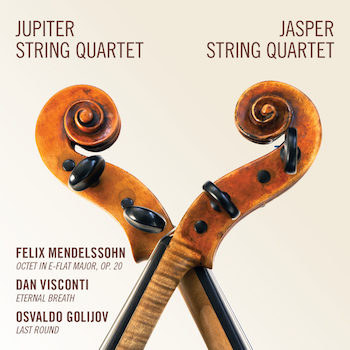Classical Album Review: Jasper & Jupiter Quartets play Mendelssohn, Visconti, and Golijov
By Jonathan Blumhofer
This joint album from the Jupiter String Quartet and Jasper String Quartet is striking for its backstory but really memorable for its smart program and fine execution.
 Chamber music is all about personal and musical relationships, as a new joint album from the Jupiter String Quartet and Jasper String Quartet reminds. The connections between these two ensembles run deep: the Jaspers’ J Freivogel is the brother of the Jupiters’ Meg and Liz Freivogel; J and Rachel Henderson Freivogel (also of the Jaspers) are married to each other; so are Daniel McDonough and Meg Freivogel (of the Jupiters); what’s more, the associations between all eight go back at least a couple of decades and…but you get the point.
Chamber music is all about personal and musical relationships, as a new joint album from the Jupiter String Quartet and Jasper String Quartet reminds. The connections between these two ensembles run deep: the Jaspers’ J Freivogel is the brother of the Jupiters’ Meg and Liz Freivogel; J and Rachel Henderson Freivogel (also of the Jaspers) are married to each other; so are Daniel McDonough and Meg Freivogel (of the Jupiters); what’s more, the associations between all eight go back at least a couple of decades and…but you get the point.
Their new album’s central selection, Dan Visconti’s nonet Eternal Breath, is, more-or-less, a tribute to the whole gang. Written in 2011 for the Freivogel’s parents’ 40th wedding anniversary, the piece takes as its concept the image of the breath of life being passed from one generation to the next (and, by extension, informing the friendships, marriages, and families that define those lives).
In Visconti’s setting, a recurring “breathing phrase” is passed through the ensemble. Melodic lines grow out of it, expanding in duration, complexity, and range as the music proceeds. A shruti box (a type of Indian reed instrument) gives the piece a particularly alluring quality; after the sudden dissipation of Breath’s intense climax, its gently pulsing drone provides a beguiling fade-out.
Taken as a whole, Eternal Breath is an often-lush and haunting essay; it also unfolds with unaffected freedom and naturalness. The Jupiters and Jaspers (plus Karen Kim on the shruti box) certainly have all of its nuances in hand, which ensures the success of this debut recording.
Much the same can be said of the combined quartets’ reading of Mendelssohn’s astonishing E-flat-major Octet that opens the album. Familiar though the piece may be, a good performance of the Octet speaks for itself; this is one of those. There’s a refined quality to the ensemble’s playing that’s striking: their phrasing is flexible, yes, and highly expressive. But, ultimately, there’s a level of comfortableness and trust to this reading that, fittingly, gives one the feeling of being privy to an amicable, lively family get-together.
The big first movement is nicely shaped, especially its involved development. Texturally, things are carefully balanced (the episodes with pizzicato accompaniment really pop) and the music’s unison phrases are spot-on.
There’s a captivating soulfulness to the slow movement, while the Scherzo is spry and playful, its inner voices all speaking cleanly. So it goes, also, with the group’s exhilarating account of the brilliant, fugal finale.
Rounding out the disc is a welcome traversal of Osvaldo Golijov’s Last Round. Golijov described the piece — written in 1996 as a tribute to Astor Piazzolla — as an “idealized bandoneon,” the characteristic instrument of the Argentinean tango. Its first movement is furiously driven, with two quartets playing off against one another. In the second, “Muertas del Angel,” the refrain of a Carlos Gardel song provides an outlet for pent-up emotional release.
The Jupiters and Jaspers (joined by bassist Michael Cameron) deliver an urgent, tightly wound account of the opening movement: a hair frenetic but, ultimately, under control (all of Golijov’s subtle touches — artificial harmonics, surprising doublings, et al. — speak). “Muertas del Angel” is fervently done, but taken at a tempo that moves just enough to keep it from becoming overly sentimental.
Altogether, then, this is an album that’s striking for its backstory but really memorable for its smart program and fine execution.
Jonathan Blumhofer is a composer and violist who has been active in the greater Boston area since 2004. His music has received numerous awards and been performed by various ensembles, including the American Composers Orchestra, Kiev Philharmonic, Camerata Chicago, Xanthos Ensemble, and Juventas New Music Group. Since receiving his doctorate from Boston University in 2010, Jon has taught at Clark University, Worcester Polytechnic Institute, and online for the University of Phoenix, in addition to writing music criticism for the Worcester Telegram & Gazette.
Tagged: Jasper & Jupiter Quartets, Jasper String Quartet, Jupiter String Quartet
